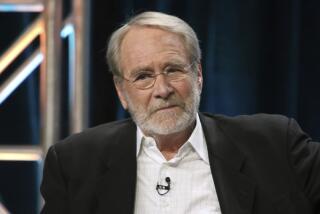A Prairie St. Sebastian : BORN BROTHERS <i> by Larry Woiwode (Michael di Capua Books/Farrar, Straus & Giroux: $19.95; 611 pp.) </i>
Since his novelistic debut with “What I’m Going to Do, I Think” (1969), Larry Woiwode (rhymes with “Why Woodie?”) has built a solid reputation for himself, based mostly on “Beyond the Bedroom Wall” (1975), the first volume in the Neumiller family history, which was nominated for a National Book Award. Woiwode is a passionate, lyrical writer (he also writes poetry), but a relentless, humorless one as well. Readers not carried away by his brooding Germanic conscience -- his fierce, guilty attachment to hearth, homeland, and traditional values--will find themselves on a long, bleak, and exceedingly strenuous trek across the Great Plains.
“Born Brothers” is an autobiographical-sounding Bildungsroman that takes up where “Beyond the Bedroom Wall” left off. At once sprawling and claustrophobic, it moves from North Dakota and Illinois in the 1940s and 1950s (Woiwode was born in Carrington, N.D., in 1941) to New York in the ‘60s and back again to North Dakota in a vaguely sketched present as the narrator, Charles Neumiller, relives his traumatic youth and recounts the less troubled but far less vivid existence of his older brother, Jerome.
The second of five children born to an old-fashioned, small-town, financially strapped Catholic family (his mother, a convert from Lutheranism, dies at 34 giving birth to a sixth, stillborn infant), Charles is caught up from the start in a world of pain, frustrated desire, and bewildering/overpowering sensations. His life is rocked by a steady barrage of accidents (falls, fights, car crashes) and diseases (strep throat, pneumonia, even a purulent case of athlete’s foot). As an adult, he stumbles into alcoholism and once tries to slit his wrists.
Joy and pleasure, it seems, are always overshadowed if not crushed by anxiety, until the end of the story when the narrator reaches a sort of nervous contentment in marriage. But most of the way, we hear little but variations on a theme of wretchedness.
Charles never stops bleeding from physical and psychic cuts and scrapes and gashes, from self-inflicted and life-inflicted wounds. Appropriately enough, he chooses the confirmation name of Sebastian, in honor of the saint (“pierced with arrows like a pincushion”) and a trapeze team called the Great Sebastians in “The Greatest Show on Earth.” A punctured saint and disaster-prone acrobat, Charles winds up as both a devout Christian and an actor-radio personality.
But neither of these vocations is convincingly explained or portrayed. We never witness Charles’ conversion from a supposedly deep-rooted tribal Catholicism to conservative Evangelical Protestantism. It’s just suddenly there, as the narrative flashes back and then, after long delays, lurches forward. In any event, Charles’ religion and his God (whom for some reason he “expect(s) to face soon” predictably afford him little consolation.
And what are we to make of Charles’ acting career? Though forced to follow in numbing detail the amateur skits he performs in with his family, we seldom see him as a grown-up professional, and his tortured, involuted social style makes it hard to imagine him enjoying, or giving enjoyment to, an audience. Does Woiwode think of him as a morose Garrison Keillor?
Charles’ monologues certainly have their dramatic momments. And yet even when Jerome and Charles crash their old Hudson into the gates of a cemetery, when he has to crawl excruciatingly back to health after smashing both his legs, when he watches an oil truck driver being incinerated as his rig explodes, when he is trapped in the seedy apartment of a crazed Puerto Rican killer, the pace is oppressively deliberate, the mood unrelievedly earnest.
And there are other problems. Charles’ parents are warmly and believably rendered: the hulking, gentle, simple-minded Martin, and the tender, sad, doomed Alpha (Jones). But we never get a clear sense of what drives Jerome (he ultimately becomes a doctor); he’s agreeable, but unrealized. And Charles’ three other siblings are practically a blank.
Having more or less stoically endured the first half of his life, Charles anticipates its conclusion in a characteristically grim and haunted passage: “I’ve received some pictures of what the end must be like, which I hope to display, although I realize that such an end could be partly like the moments I’m often caught in, when I wake wondering what room it is I’ve awakened in, with a disjointed incomplete task to straighten out for the final time, before the fire consumes it all, or the executioner knocks, this time with deputies carrying shackles--each minute lengthening into what I imagine, indeed, eternity could be.” So much for the afterlife.
Woiwode’s vision has undeniable honesty, humility, and love. It’s sometimes powerful and arresting. But it’s hard to take. Woiwode’s language, though fluent, is clotted and obscure. Many sentences have to be reread and puzzled over to make ready sense. The martyrdom of this St. Sebastian of the Prairies edifies, but it fails to delight.
More to Read
Sign up for our Book Club newsletter
Get the latest news, events and more from the Los Angeles Times Book Club, and help us get L.A. reading and talking.
You may occasionally receive promotional content from the Los Angeles Times.






